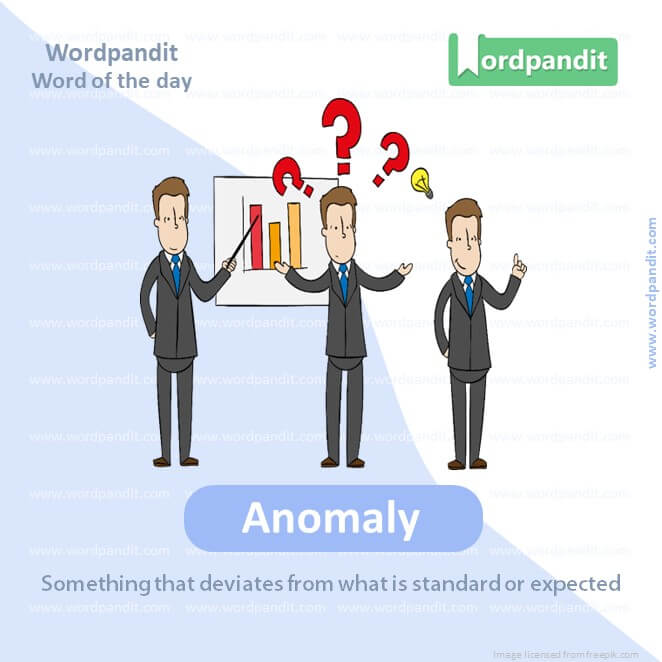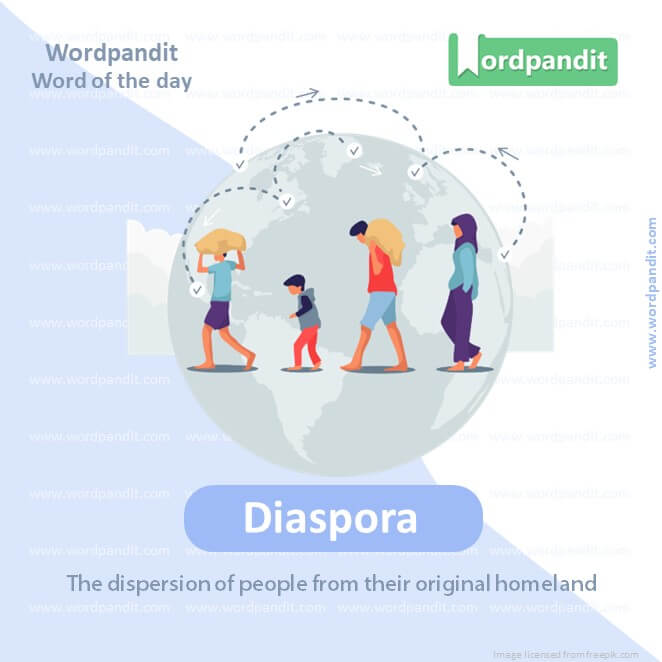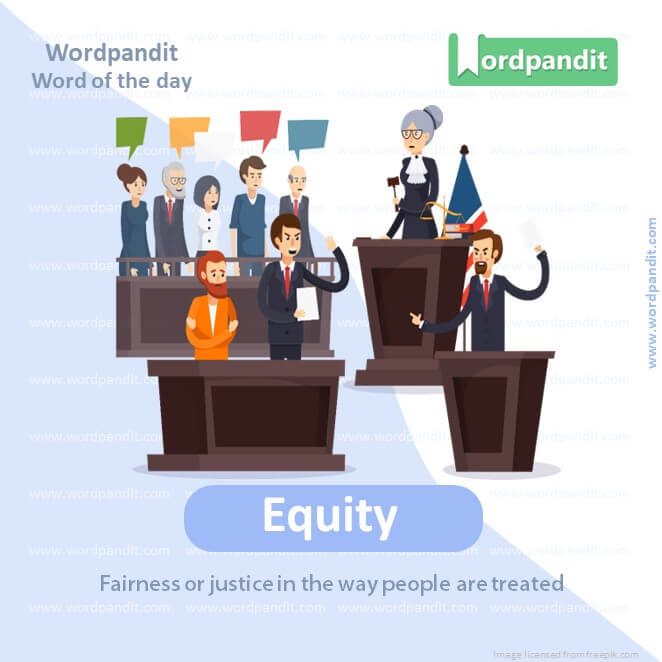Daily Vocabulary Words: List of Daily Used Words in Leading International Newspapers
Hi there. Welcome to this special section @ Wordpandit.
Our endeavour here is very simple: to highlight important daily vocabulary words, which you would come across in leading newspapers in the country. We have included the following newspapers in our selection:
• The New York Times
• The Washington Post
• Scientific American
• BBC
• The Guardian
• Psychology Today
• Wall Street Journal
• The Economist
We are putting in extensive work for developing your vocabulary. All you have got to do is be regular with this section and check out this post on a daily basis. This is your repository of words that are commonly used and essentially, we are posting a list of daily used words. Hence, this has significant practical application as it teaches you words that are used commonly in leading publications mentioned above.
Visit the website daily to learn words from leading international newspapers.

WORD-1: ANOMALY
CONTEXT: The rise of cryptocurrencies is an anomaly in the financial world, given their lack of intrinsic value, yet they continue to gain acceptance among investors and the public.
SOURCE: The New York Times
EXPLANATORY PARAGRAPH: Anomaly is like something unusual or different. Imagine having an orange in a basket of apples, it would seem strange, right? That’s what we call an anomaly!
MEANING: Something that deviates from what is standard or expected (Noun)
PRONUNCIATION: uh-nom-uh-lee
SYNONYMS: Aberration, Outlier, Oddity, Quirk, Inconsistency
USAGE EXAMPLE:
1. The climate anomaly has caused unusual weather patterns.
2. Her dislike for ice cream is an anomaly among children.
3. The anomaly in the experiment results puzzled the scientists.
4. The dog had a genetic anomaly that made its fur color unique.
5. Spotting a dolphin in the city’s harbour was a delightful anomaly.

WORD-2: DEBUTANT
CONTEXT: The debutant author, in his new book, explores the realm of psychological thrillers, introducing a fresh voice and perspective to the genre.
SOURCE: The Guardian
EXPLANATORY PARAGRAPH: A debutant is someone who is doing something for the first time. Like when you rode your bicycle by yourself for the first time, you were a debutant!
MEANING: A person who is new to an organization or activity (Noun)
PRONUNCIATION: deb-yuh-tant
SYNONYMS: Beginner, Novice, Neophyte, Newcomer, Initiate
USAGE EXAMPLE:
1. He was a debutant in the grand chess tournament.
2. As a debutant in cooking, she found the recipe quite challenging.
3. The debutant actor received praise for his performance in the play.
4. His debutant book retained a sense of freshness and originality.

WORD-3: DIASPORA
CONTEXT: In the recent years, a significant part of the Indian diaspora in the US has been increasingly engaged in the political process, highlighting the diversity and active participation of immigrants.
SOURCE: The Washington Post
EXPLANATORY PARAGRAPH: Diaspora is a big word that means people who have moved away from their original home, but still have a strong connection to it. Like how some birds fly away from their nest but remember where they came from!
MEANING: The dispersion of people from their original homeland (Noun)
PRONUNCIATION: dy-as-por-uh
SYNONYMS: Dispersion, Migration, Scattering, Exodus, Displacement
USAGE EXAMPLE:
1. The Jewish diaspora has been a subject of study for many historians.
2. The Indian diaspora in the United States is quite significant.
3. The diaspora community has preserved their cultural traditions.
4. The music festival attracted people from the global diaspora.

WORD-4: EQUITY
CONTEXT: Private equity firms are facing increased scrutiny due to the large amount of leverage they use in acquiring companies, raising concerns about the financial stability of their acquisitions.
SOURCE: The Economist
EXPLANATORY PARAGRAPH: Equity is about being fair and equal. Imagine if you and your friend divide a pizza into equal slices so that each of you gets the same amount. That’s what equity is!
MEANING: Fairness or justice in the way people are treated (Noun)
PRONUNCIATION: eh-kwuh-tee
SYNONYMS: Fairness, Justice, Impartiality, Fair Play, Parity
USAGE EXAMPLE:
1. The company promised to commit to the principles of equity and inclusion.
2. The housing policy is a big step toward ensuring equity.
3. She has a significant amount of equity in the company.
4. Our new constitution ensures equity for all citizens.

WORD-5: TESTAMENT
CONTEXT: The newly discovered ancient scrolls are touted as a testament to the sophisticated literary culture of the Greek civilization.
SOURCE: BBC
EXPLANATORY PARAGRAPH: Testament is like a proof or evidence of something. When you get good grades, it’s a testament or proof that you studied hard!
MEANING: A clear sign or proof of something (Noun)
PRONUNCIATION: tes-tuh-ment
SYNONYMS: Proof, Evidence, Confirmation, Demonstration, Indication
USAGE EXAMPLE:
1. The large crowd was a testament to the popularity of the band.
2. His success is a testament to his hard work and determination.
3. The ancient monument is a testament to the architectural brilliance of the past.
4. Her recovery was a testament to her fighting spirit.
WORD-6: CANNY
CONTEXT: The CEO, recognized for his canny business judgment, has led the company to record profits in the last quarter despite economic uncertainties.
SOURCE: The Economist
EXPLANATORY PARAGRAPH: Canny is a word we use when someone is really clever and makes smart decisions. So, if you save your pocket money to buy a big toy later instead of spending them right away, you’re being canny!
MEANING: Showing shrewdness and good judgement, particularly in money or business matters (Adjective)
PRONUNCIATION: kan-ee
SYNONYMS: Shrewd, Clever, Savvy, Astute, Sharp
USAGE EXAMPLE:
1. She made a canny business deal that doubled her profits.
2. The canny old man was known for his wise counsel.
3. He is a canny investor, known for his strategic decisions.
4. His canny remarks often addressed the heart of the issue.
WORD-7: RESUSCITATION
CONTEXT: Modern medicine has seen unprecedented advances in resuscitation techniques, allowing medical professionals to revive patients who would have been considered beyond help in previous decades.
SOURCE: Scientific American
EXPLANATORY PARAGRAPH: Resuscitation is like helping someone get better when they are seriously ill or in complete danger. Like when a lifeguard helps a person who can’t breathe by giving them special breaths, that’s called resuscitation.
MEANING: The process of reviving someone from apparent death or unconsciousness, especially by using artificial respiration (Noun)
PRONUNCIATION: re-suh-si-ta-shun
SYNONYMS: Revival, Revivification, Reanimation, Recovery, Resurgence
USAGE EXAMPLE:
1. The medical team attempted resuscitation, but it was too late.
2. The lifeguard quickly applied resuscitation techniques to revive the drowning man.
3. CPR is a common form of resuscitation used in emergencies.
4. Training in resuscitation is a requirement for most healthcare professionals.
WORD-8: ORDAINED
CONTEXT: A human rights activist was ordained as the new leader of the global campaign against racial and religious discrimination, lending a powerful voice to the underrepresented.
SOURCE: Al Jazeera
EXPLANATORY PARAGRAPH: Ordained means being officially chosen for a special job or purpose. Like when you are chosen to be the leader of your team in a school event, you can say you were ordained as the team leader!
MEANING: Make (someone) a priest or minister; confer holy orders upon (Verb)
PRONUNCIATION: or-dayned
SYNONYMS: Consecrated, Authorized, Commissioned, Anointed, Appointed
USAGE EXAMPLE:
1. He was ordained as a priest in his local church.
2. The queen ordained him as her representative in the foreign territory.
3. The document was officially ordained by the council.
4. She had a feeling she was ordained for something big.
WORD-9: DULCET
CONTEXT: His dulcet voice resonated in the hall, captivating the audience at the annual music festival.
SOURCE: The Guardian
EXPLANATORY PARAGRAPH: Dulcet means something that sounds very pleasant to your ears. Like the sound of your favorite song or the sound of birds chirping, that can be called dulcet!
MEANING: (Especially of sound) sweet and soothing (Adjective)
PRONUNCIATION: duhl-sit
SYNONYMS: Melodious, Sweet Sounding, Harmonious, Melodic, Musical
USAGE EXAMPLE:
1. The dulcet tones of the piano filled the room.
2. She has a dulcet voice that could soothe anyone.
3. He was known for his dulcet tunes on the guitar.
4. The countryside was filled with the dulcet sounds of nature.
WORD-10: PROFITEERING
CONTEXT: The government has pledged to combat corporate profiteering, and to ensure that essential goods remain affordable for all citizens during the pandemic.
SOURCE: BBC
EXPLANATORY PARAGRAPH: Profiteering is when someone tries to make lots of money in a way that isn’t very fair, like if someone charges too much for something just because people really need it.
MEANING: The act of making excessive profits on goods or services, especially during times of emergency or shortage (Noun)
PRONUNCIATION: prof-i-teer-ing
SYNONYMS: Exploitation, Greed, Avarice, Price Gouging, Overcharging
USAGE EXAMPLE:
1. The government took stringent measures to curb profiteering during the crisis.
2. Several shopkeepers were booked for profiteering during the storm.
3. The company’s profiteering was exposed by a group of whistleblowers.
4. Accusations of profiteering were leveled against the supplier of emergency goods.
Vocabulary new Words
In the exuberant realm of language learning, nothing holds more thrill than the discovery of ‘vocabulary new words’. These gems of knowledge bring with them a fresh perspective and a deeper understanding of language. However, learning ‘vocabulary new words’ requires a methodical and focused approach.
The act of learning ‘vocabulary new words’ is a delve into linguistic novelty, often involving exposure to unfamiliar structures and meanings. Transcending the traditional approach of mere memorization helps in truly cementing newly learnt words into long-term memory. Interaction with a broad spectrum of written and spoken material, including novels, films, podcasts, and digital resources, provides a rich context of ‘vocabulary new words’ and significantly aids in their comprehension.
It’s noteworthy that unpacking ‘vocabulary new words’ is a steady process rather than a rushed one. A planned approach with a specific number of words, learned and reviewed each day, proves beneficial in effective learning. Coupling this method with technologies such as flashcards or memory-enhancement software can optimize the retention of ‘vocabulary new words’.
Integrating mnemonic devices and visual imagery is another highly efficient tool when learning ‘vocabulary new words’. Assigning unique stories or visuals to new words can enhance recall, making unfamiliar vocabulary much more approachable.
Lastly, practicing ‘vocabulary new words’ within daily routine is crucial for grasping their usage. Whether it’s through active utilization in conversation or incorporating these words in written communicative situations, application reinforces understanding.
In summation, mastering ‘vocabulary new words’ is an enriching pursuit that expands our linguistic horizons. However, a balanced approach, combining diverse reading materials, pacing your learning, employing memory-boosting strategies, and daily practice greatly streamlines the task. Embark on this fascinating journey, and let the ‘vocabulary new words’ fill your linguistic canvas with a fresh palette of expressions.











